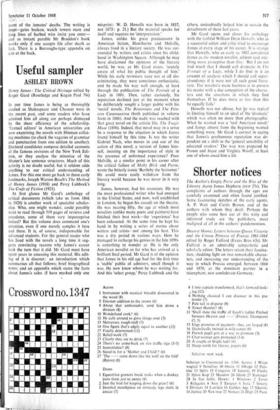Useful sampler
ASHLEY BROWN
In our time James is being as thoroughly studied as Shakespeare and Chaucer were in the recent past, and some readers who have admired him all along are perhaps dismayed by the sheer efficiency of the scholarship. 'Textual editors' in American universities are now examining the novels with Hinman collat- ing machines (to check the vagaries of grammar and punctuation from one edition to another). Doctoral candidates compose detailed accounts of the famous revisions of the New York Edi- tion, or they analyse the minutiae of the Master's late sentence structures. Much of this activity is no doubt useful, but it seldom adds anything to our critical understanding of James. For this one must go back to those early landmarks, Joseph Warren Beach's The Method of Henry James (1918) and Percy Lubbock's The Craft of Fiction (1921).
At first glance Mr Gard's anthology of critical documents (which take us from 1866 to 1920) is another work of specialist scholar- ship. Who, one might wonder, could possibly want to read through 519 pages of reviews and anecdotes, some of them very imperceptive indeed? But this volume does command one's attention, even if one merely samples it here and there. It is, of course, indispensable for advanced students. For the general reader who has lived with the novels a long time it sug- gests convincing reasons why James's career took the turn that it did. Mr Gard must have spent years in amassing this material. His edit- ing of it is discreet: an introduction which summarises all that follows; brief biographical notes; and an appendix which states the facts about James's sales. (I have marked only one misprint: W. D. Howells was born in 1837, not 1873: p. 21.) But the material speaks for itself and requires no 'interpretation.'
James, unlike his great predecessors in American fiction, Hawthorne and Melville, always lived in a literary society. He was sur- rounded by writers and critics since his child- hood in Washington Square. Although he may have disclaimed the opinions of the literary world, he was, as Mr Gard states, 'acutely aware of what his public thought of him.' While his early reviewers were not at all dis- criminating, they were sometimes enthusiastic, and he made his way well enough, at least through the publication of The Portrait of a Lady in 1881. Then, rather curiously, his reputation declined just at the moment when he deliberately sought a larger public with his `social' novels, The Bostonians and The Prin- cess Casamassima (both published in volume form in 1886). And the nadir was reached with that great novel on the artistic life, The Tragic Muse (1890). Indeed, that novel may in a sense be a response to the situation in which James found himself by this time. Is not the writer Gabriel Nash, who moves in and out of the action of this novel, a version of James him- self, insisting on the importance of style in the presence of unformed experience? Poor Melville, at a similar point in his career after the critical failure of Moby Dick and Pierre, wrote the bitterly ironic `Bartleby the Scrivener.' He could more easily withdraw from the literary world because he was never in it very long.
James, however, had his resources. He was the most professional writer who had emerged in the United States, and now, well established in London, he began his assault on the theatre. He was nearing fifty, the age at which most novelists (unlike many poets and painters) have finished their best work—the 'experience' has been exhausted. At the same time he kept his hand in by writing a series of stories about writers and artists—not among his best. This was a dry period in various ways. How he managed to recharge his genius in the late 1890s is something to wonder at. He is the only American novelist so far who has arrived at a brilliant final period. Mr Gard is of the opinion that James in his old age had for the first time a 'stable' public of admirers, small though it was. He now knew whom he was writing for. And this 'select group,' Percy Lubbock and the others, undoubtedly helped him to sustain the detachment of these last years.
Mr Gard opens and closes his anthology with the faithful William Dean Howells. who as a successful editor and critic tried to encourage James at every stage of his career. It is strange that Howells, who as early as 1882 considered James as the modern novelist, seldom said any- thing more perceptive than this: 'But I do not find much that 1 should call dramatic in The Portrait of a Lady, while I do find in it an amount of analysis which I should call super- abundance if it were not all such good litera- ture. The novelist's main business is to possess his reader with a due conception of the charac- ters and the situations in which they find themselves. If he does more or less than this he equally fails.'
Howells was not obtuse, but lie was typical in limiting himself to an ideal of the 'dramatic' which was often no more than photographic. What he wanted was a 'real American novel,' and Jaw almost from the beginning wanted something more. Mr Gard is correct in saying that James's posthumous reputation was de- pendent on a shift in the 'general sensibility of educated readers.' The way was prepared by Proust and Joyce and Virginia Woolf, at least one of whom owed him a lot.






































 Previous page
Previous page